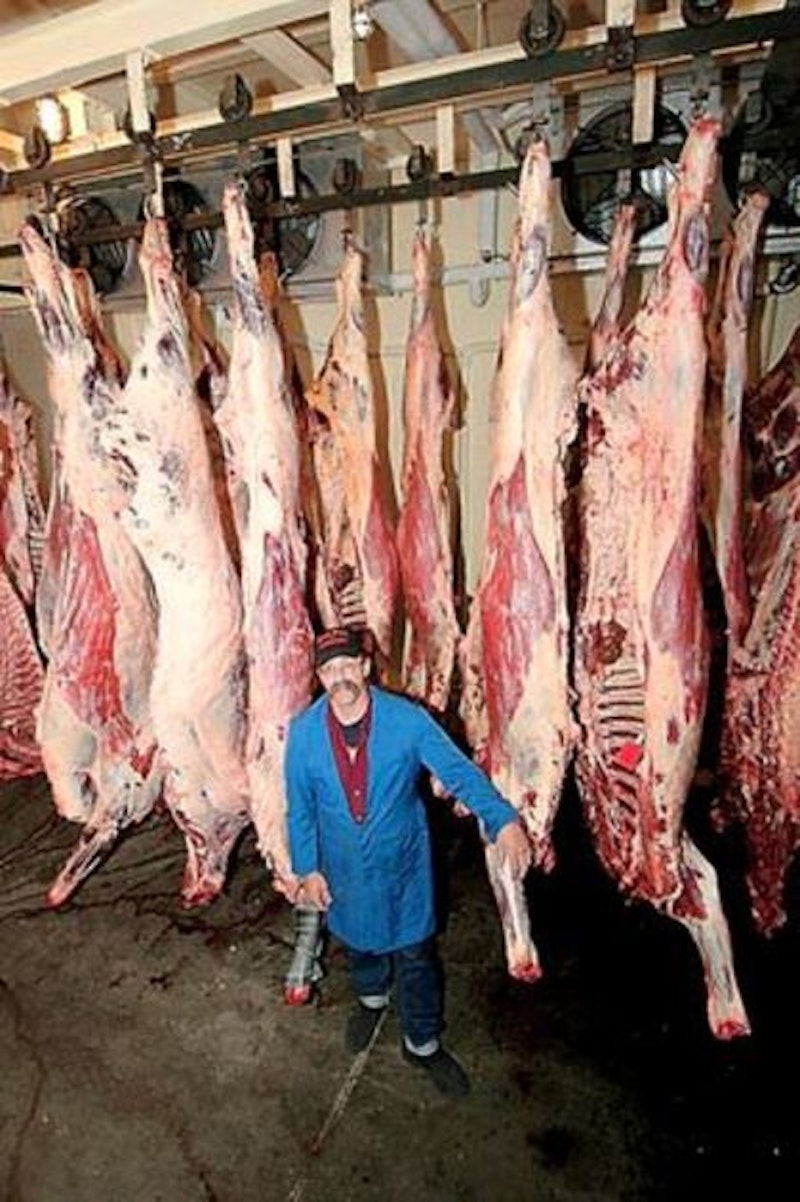My taste for meat tends to ebb and flow, but lately the tide has gone out on my cravings. With fresh recalls of meat in the news nearly every month, the steaks and chops under glass at the local grocer seem less like appealing victuals and more like what they actually are - slabs of slowly rotting flesh.
If I thought I had the discipline to be a vegetarian, I'd probably go for it, but those waves of longing for chicken tikka masala still float up on the beach every so often, leaving me to waver between a leaf and a lamb chop.
The worst part of my quandary is that I find myself increasingly fascinated by the blind cruelty that lurks beneath the charbroiled surface of a juicy burger. The more gory details I uncover about factory farming, the more disgusted I become, and yet, perversely, I want to know more.
For instance, we've all heard those twisted tales about chickens kept in cages as small as a computer screen where they can't even flap a wing for their entire, miserably short lives.
Or take that filthy chatter about how pigs are pumped with drugs to keep them alive in tiny squalid pens. They're also force-fed growth hormones that make them swell to the point that they become crippled under their own sheer mass.
If that isn't enough for you, how about the recent news regarding diseased and dying cows that were shocked, kicked and rammed with forklifts to get them to move past inspectors on their "own volition?"
The most disturbing thing about all this hideous hearsay is that it's completely true.

In a recent Easterner editorial, Megan Zipperer highlighted the cattle cruelty by Hallmark Meat Packing. It's telling that Kenneth Peterson, the Food Safety inspector she mentioned, said he'd have preferred whistleblowers to bring this information directly to his agency and not release it to the public.
How do I reply to the pock-faced teen behind the counter who asks, "Would you like bacon on your triple-cheeseburger?" when I know the agencies in charge of my well-being would rather blanket reality than tell me about contaminated livestock being tortured to slaughter?
If I wasn't so sadistically interested in the truth, all this animal cruelty would be easy enough to ignore. Instead of pigs, we eat pork. It's not pulverized cow flesh, it's hamburger. Cartoons of frolicking chickens grace that carton of eggs, not snap-shots of dimly lit, feces-spattered warehouses.
Even the word "livestock" eradicates the prospect that an animal is an entity with any feeling.
If I can somehow remain indifferent toward the living conditions of animals, what about my own environment?
According to the Environmental Protection Agency (EPA), 61 million tons of hog, chicken and cattle waste are produced every year in this country. This equals out to five tons of stink for every one of us, enough to pollute 35,000 miles of rivers in 22 states and critically contaminate groundwater in 17 states.
Since those five tons of manure aren't sloshing around my living room, however, I could ignore that mess too.
What about my own species? Should I care about them?
Jim Motavalli, in his essay "The case against meat," says that for every five pounds of grain fed to a cow, we get one pound of beef for human consumption. It startles me to realize that if America didn't have such a voracious appetite for meat, world hunger could probably be abolished.
But if by some acrobatic feat of flexible logic I can find a way to disregard all the rest, what about my own health? The Organic Consumers Association, a non-profit watchdog group, says that the average American consumes nearly twice his or her weight in meat every year. This heavy consumption of animal protein has been linked to obesity, heart disease and even cancer.
The more I've looked into the meat matter, the more difficult it is to ignore the overwhelming reasons not to eat it.
Everyone from the EPA to Albert Einstein seems to understand, on an intellectual level anyhow, that eating meat isn't good for anyone. Einstein famously said, "Nothing will benefit human health and increase chances for survival on earth as much as the evolution to a vegetarian diet."
Are my occasional cravings for a thick slice of ham really worth the price? I have to conclude that there are more important things in life than my personal appetites. While no amount of reasoning will ever convince the hardened carnivores among us, I can take personal responsibility for my own diet. I still can't say definitively that I'll never eat meat again, but at least now I'll think long and hard about the origins and consequences of my meals.
Image from the Alaska Journal

